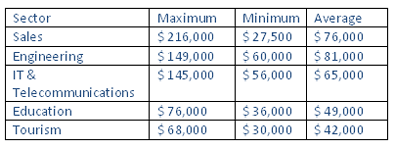IELTS test in Australia – March 2010 (Academic Module)
IELTS test in Australia (Gold Cost) was identical to the exam in Brunei. Normally, I would leave it at that, but our friend V. managed to remember a lot of additional information – including the actual table that was given in the Writing Task 1 and the questions in Speaking. Enjoy!
Listening test
Section 1. We heard a conversation between a club receptionist and a person who was inquiring about purchasing a membership for his friends.
Questions: filling in the gaps on a form that showed the address of the club, monthly fees, joining fee, available facilities, telephone number.
Section 2. A phone conversation about tourist packages to visit ‘SOME’ Caves.
Questions: filling in the gaps on a form that described prices of the ticket per person and per group, history of the caves, various extra activities offered to the tourists.
Section 3. A conversation between a tutor and two students was played.
Questions: multiple choice questions about type of essays students were supposed to write, word limit, main topic of the essay, etc.
Section 4. Lecture about significance of airports was played. Lecturer has been speaking about 5 different scenarios of what will happen with the airports in the future.Questions: Choose a title for each scenario. It wasn’t easy to listen to the speaker and at the same time keep scrolling for the title of the scenario, as written titles were very much paraphrased and sounded differently in the recording.
Reading test
Passage 1. Effects of junk food advertising on children.
Passage 2. Shoemaker-Levy 9, comet that hit Jupiter.
Passage 3. Research paper about talent as a quality to be assessed by employers.
This was quite an interesting text, as it questioned conventional methods of measuring intelligence as ineffective to distinguish talented people. Example of Bach was given. Bach was an amazing composer, however, he wasn’t recognized for a while. The standards of recognition in music during those days had to change in order to appreciate Bach’s greatness. Ironically, this text was included in IELTS, which is a test measuring intelligence in a very conventional way.
Writing test
Writing Task 1
The table shows the maximum, minimum and average annual salaries in 5 different sectors in Australia in 2006. Write a report to a university lecturer describing the table below.
Writing Task 2
Studies show that television has a negative effect on children, who spend more time watching TV these days rather than being active playing outdoors.
What do you think is the case?
What measures can you suggest to encourage children to be more active?
Speaking Test
Interview
– Introduce yourself.
– Where do you come from?
– What is your work?
Cue Card
Describe the town that I you are from or where you lived a long time. Please say:
– Where is that town?
– Why is that town important to you?
– What is your feeling towards that town?
Discussion
– What is your opinion about the differences in life style in the cities and smaller towns.
– How would you describe sounds you hear in the city in comparison to those that can be heard in small towns?



